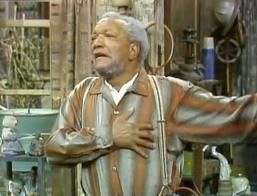
Life truly imitated art when Redd Fox collapsed of heart failure in 1991 on set. Best known for his quick wit and raspy voice, the tragedy was marred with irony since he coined his signature move of clenching his chest as if he was having a heart attack for dramatic, comedic effect while starring in the classic sitcom Sanford & Son.
Born John Elroy Sanford, the bow-legged foul-mouthed comedic genius rotated in circles with Richard Pryor and Eddie Murphy, holding own in blockbuster movies and sold-out tours.
He’d even inked a deal on a new show during the time of his sudden death. His career was still thriving. But unfortunately, his body couldn't keep up. His story echoes that of countless others in the Black community as they are the leading group to be diagnosed with heart disease. According to the Center for Disease Control (CDC), although Black people are 40 percent more likely to have high blood pressure, they are less likely than their white counterparts to have their blood pressure under control.
 In 2017, it was reported that Black people were 20 percent more likely to die from heart disease than white people. According to the US Department of Health and Human Services Office of Minority Health, Black women are 60 percent more likely to have high blood pressure, as compared to non-Hispanic white women which can lead to cardiac arrest.
In 2017, it was reported that Black people were 20 percent more likely to die from heart disease than white people. According to the US Department of Health and Human Services Office of Minority Health, Black women are 60 percent more likely to have high blood pressure, as compared to non-Hispanic white women which can lead to cardiac arrest.
What is a heart attack?
According to the American Heart Association, a heart attack occurs when a blocked artery prevents oxygen-rich blood from reaching a section of the heart. If the blocked artery is not reopened quickly, the part of the heart normally nourished by that artery begins to die. The longer a person goes without treatment, the greater the damage.
Symptoms of a heart attack may be immediate and intense. More often, though, symptoms start slowly and persist for hours, days or weeks before a heart attack. Unlike with sudden cardiac arrest, the heart usually does not stop beating during a heart attack. The heart attack symptoms in women can be different than in men.
What are some symptoms to look out for?
Most people who’ve had heart attacks report symptoms like:
- Pressure, tightness, pain, or a squeezing or aching sensation in your chest or arms that may spread to your neck, jaw or back
- Nausea, indigestion, heartburn or abdominal pain
- Shortness of breath
- Cold sweat
- Fatigue
- Lightheadedness or sudden dizziness
- Heart attack symptoms vary
Despite what we might have thought, not all people who have heart attacks have the same symptoms or have the same severity of symptoms.
Some people might experience mild pain while others have debilitating physical signs. Scarily enough, some people have no symptoms at all.
Some heart attacks take people by surprise, but many have warning signs and symptoms hours, days or weeks in advance.
The earliest warning might be consistent chest pain or pressure that's triggered by highly intense activity and relieved by rest.

What are the risk factors?
According to the American Heart Association patients heart attacks can be linked to the following factors:
- Age. Men age 45 or older and women age 55 or older are at risk for a heart attack.
- Tobacco. Those who regularly smoke cigarettes or use tobacco products.
- High blood pressure. High blood pressure definitely weakens the heart and exposes it to failure.
- High blood cholesterol or triglyceride levels. A high level of low-density lipoprotein (LDL) cholesterol ("bad" cholesterol) is most likely to narrow arteries. A high level of triglycerides, a type of blood fat related to your diet, also increases your risk of a heart attack. However, a high level of high-density lipoprotein (HDL) cholesterol ("good" cholesterol) may lower your risk.
- High BMI. Morbid obesity is linked with high blood cholesterol levels, high triglyceride levels, high blood pressure and diabetes. Losing just 10% of your body weight can significantly lower this risk.
- Diabetes. Not producing enough of a hormone secreted by your pancreas (insulin) or not responding to insulin properly causes your body's blood sugar levels to rise, increasing your risk of a heart attack.
- Metabolic syndrome. This syndrome occurs when you have obesity, high blood pressure and high blood sugar. Having metabolic syndrome makes you twice as likely to develop heart disease than if you don't have it.
- Genetics. If your siblings, parents or grandparents have had early heart attacks (by age 55 for males and by age 65 for females), you might be at increased risk.
- Sedentary lifestyle. Being inactive contributes to high blood cholesterol levels and obesity. People who exercise regularly have better heart health, including lower blood pressure.
- High stress levels. Stressful lifestyles can significantly increase the risk of a heart attack.
- Recreational drug use. Using stimulant drugs, such as cocaine or amphetamines, can trigger a spasm of your coronary arteries that can cause a heart attack.
- Preeclampsia. This condition causes high blood pressure during pregnancy and increases the lifetime risk of heart disease.
- An autoimmune condition. Having a condition such as rheumatoid arthritis or lupus can increase your risk of a heart attack.
Preventing a heart attack.
At this point, we all know that the best way to prevent most medical diseases is through healthy lifestyle choices.
Maintaining a healthy weight mostly a clean diet, avoiding smoking, exercising at least 2-3 regularly times weekly, and managing can cut risk for heart strain.
BDO’s Black History of Health series is designed to show the correlation between the health of historical black figures and Black Americans today. Many of the health disparities we currently experience have been in our community for centuries. This series is meant to bring these conditions to the forefront and provide blacks with preventative and management steps to reduce these disparities and improve the overall health of the Black American community. It’s time to change the narrative.









